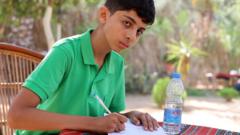As the sun sets on the battered city of Gaza, children are not playing in the streets or sitting in classrooms, but are facing the grim realities of warfare. Among them is 11-year-old Zakaria, who has transformed his childhood into a series of hazardous responsibilities at al-Aqsa Hospital. Since the onset of the war, he estimates seeing thousands of bodies, a burden no child should bear. Zakaria spends his days volunteering, maneuvering through crowds of victims brought in by the steady stream of ambulances.
While his friends have fallen victim to the ongoing conflict, Zakaria's selfless dedication to helping paramedics provides him with a sense of purpose in a reality filled with trauma. “I must have seen at least 5,000 bodies,” he recounts, reflecting on the chilling experiences that no child should endure. His journey, filmed for the BBC documentary "Gaza: How to Survive a Warzone," showcases the innocence lost in a land ravaged by violence.
Documentary creators Jamie Roberts and Yousef Hammash aimed to portray the everyday lives of Gazans amid this crisis, using local cameramen to gather footage after international journalists were barred from entering Gaza. The film, which focuses on several children and a young mother, displays their resilience in the face of adversity, especially highlighted by the stark contrast between their ages and the roles they are forced to play.
Additionally, 10-year-old Renad finds escape in a unique way—through the lens of her TikTok cooking show. She continues to pursue her passion for food, amassing over a million followers despite the constant struggle to source ingredients in a war zone. Alongside her, Abdullah, 13, strives to keep his education alive, hoping to maintain a sense of normalcy amid chaos.
Yet, the dark backdrop of this humanitarian crisis cannot be ignored. More than 48,200 lives have been lost due to the conflict, and the innocents, including children, are often the most affected. The documentary elucidates how, despite being designated a "humanitarian zone," the area has faced repeated strikes, underlining an alarming disconnect between the labels used in war and the reality on the ground.
As Zakaria assists the hospital staff, he even receives a mini set of scrubs, symbolizing the respect he garners from those around him. Yet, the psychological toll weighs heavily. "I want to be a paramedic," he states, revealing a yearning for a future beyond the chaos, but knowing that first, he must escape the immediate horrors that suffocate his existence.
The documentary captures the essence of childhood resilience amid war’s devastation, showing how the young no longer have the luxury of innocence. As the camera follows Zakaria, Renad, and Abdullah, it becomes clear that their stories are not just about survival, but also about the unyielding hope that lingers amid despair.














